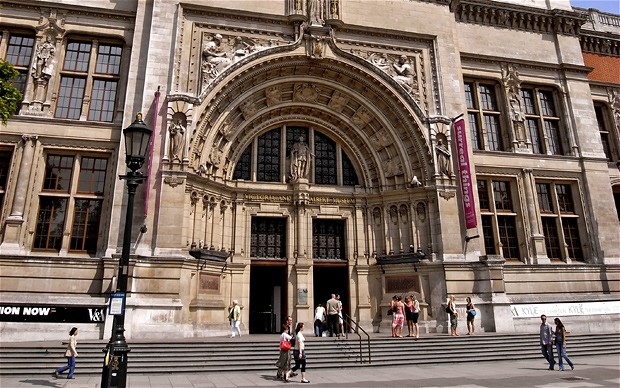‘Critics are Parasites’
Meet the Critics at the V&A organised by the Critics Circle 27/04/13
I coordinate the activities of the Young Critics, the new 3rd Age Critics group and helped set up the inaugural Theatre Critics of Wales Awards at Sherman Cymru earlier this year. I read with interest that the Critics Circle was organising a free event for anyone interested in a critical understanding of the arts and went along to learn more.
The morning session was chaired by Paul Gambaccini and comprised of a series of five panels consisting of three critics, one panel from each Critics Circle section, Drama, Music, Film, Dance and Visual Arts, the panellists talked about their relevant fields and answered questions. Critics present included Michael Billington, Mark Shenton, Jason Solomons, Barry Norman, Marine Vaizey, Claire Allfree, Jeffery Taylor, Libby Purves, Fiona Mountford, Richard Morrison, Guy Dammann, Erica Jeal, Sanjoy Roy, Donald Hutera, Simon Tait, Hugh Pearman and Sarah Crompton.
The morning session consisted of the different critic’s panels discussing their entry routes into the world of arts criticism, this being most frequently that of the journalist.
There were some interesting and provocative statements relating to the critical process with Barry Normans definition of the critic as ‘parasites’ appearing to resonate most strongly in the room.
Other statements included,
- The critic must be honest to the audience.
- Don’t bore the reader.
- The opinion of the star struck critic is worthless.
- Don’t be in awe of someone who earns their living from pretending to be someone else.
- Critics shouldn’t be populist celebrities it’s a form in its own right.
- Someone over 40 with considerable life experience and knowledge of their form is a better critic than that of a young person.
- Be brave, failure is good.
- Nobody wants to make bad work.
- A review can be better if the critic understands the artist’s intention.
- Good writing is rewriting.
- The critic provides the match report.
- Make the reader know what it was like to be there.
- The critic is a professional member of the audience.
- Without critics we risk the sound of one hand clapping.
- The best critics are practioners, but not the best reviewers.
The second half of the session was chaired by Mariella Frostrup and devoted to the future of the critic and their trade. Topics for discussion included what might happen to criticism in the age of the blogger, the impact on the critic’s trade and the standards of the on-line amateur with opinions but no qualifications for holding opinions, the tweeter who tweets without thought, and of people who have no experience of life.
I felt this afternoon session focused primarily on many of the negative elements of the internet and the changes currently taking place in the world of arts criticism.
It was immediately apparent that the process of change currently taking place for many arts journalists is a very difficult process but I felt that many of the positive aspects of the internet were overlooked. This also seemed to relate to the opinion of some of the panellists and the Critics Circle themselves, they seemed to think that for a critic to have a worthwhile opinion they need to have considerable life experience and to have an in-depth knowledge of their subject matter. Whilst I am sure this is true to an extent I feel this risks alienating a huge sector of new potential critic’s especially younger ones.
In my opinion the positive developments of ‘everyone is a critic’ alongside the internet has allowed a more inclusive voice to be heard regarding many art forms. There are a range of audiences/ages for much of the work created and I don’t feel its representative to only focus on the voices of older predominately male critics.
I feel that projects such as Young Critics, 3rd Age Critics, Wales Arts Review and magazine websites such as A Younger Theatre help to support a more honest, inclusive critical voice as opposed to the Critics Circle ideal critic
‘Which is not to say critics should be dinosaurs just that they should have lived a little.’
With these thoughts in mind the Young Critics have arranged the event below to continue the discussions in Wales
‘Response’
A series of critical conversations The Wales Millennium Centre, Cardiff, Sat the 7th of Sep 10-4 pm.
Subjects for discussion at Response may include
- Venue/producers presentation, an open forum to discuss the relationship with Arts Critics, venues, producers and artists.
- Lack of critical commentary in an area, and what can be done/is being done to support work.
- Looking beyond the traditional routes for criticism, how can engagement go further?
- Producing venues from across Wales will be invited to attend these days to showcase their work and invite a critical response (this will be cross art form).
- The notion of the “professional” critic in the age of blogging; a discussion with arts practitioners about the kinds of criticism (if any) which they find useful.
- Arts Criticism in the Welsh Language (With a focus on work for younger audiences).
- The future role of the Arts Critic.
If you have any suggestions for discussion topics or would like to present at Response please let me know.
Critic’s Circle article on their event.
http://www.criticscircle.org.uk/Default.asp?ID=330&PID=1

